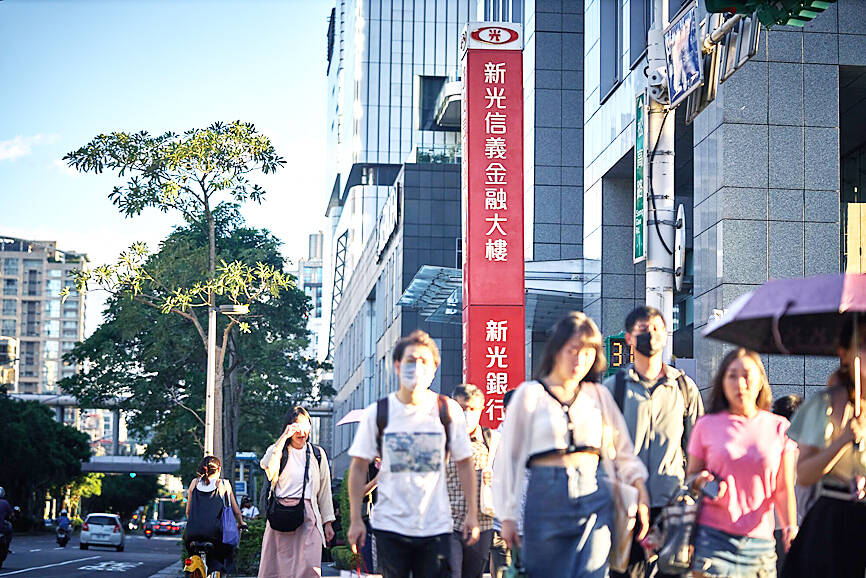Some Shin Kong Financial Holding Co (新光金控) shareholders appear to be pressing ahead with efforts to veto a merger with Taishin Financial Holding Co (台新金控) at a shareholders’ meeting next month, even after the Financial Supervisory Commission (FSC) on Monday rejected CTBC Financial Holding Co’s (中信金控) bid to acquire Shin Kong Financial.
Shin Kong majority shareholder and former board director Lin Po-han (林伯翰) on Monday urged retail shareholders to remain united and reject the merger at an extraordinary shareholders’ meeting on Oct. 9 to keep Shin Kong Financial alive.
“Let’s stay united and guard our own interests in the absence of CTBC Financial,” Lin said.

Photo: An Rong Xu, Bloomberg
He could find an ally in Shin Kong board director Olivia Wu (吳欣儒), her father, Eugene Wu (吳東進), and others, who have voted against the merger or shown reservations about the deal.
Taishin Financial expressed gratitude to the commission for its decision, while calling on shareholders to support the merger, which it said would benefit the two firms, their employees, customers and shareholders.
Life insurance-oriented Shin Kong Financial also said it respected the commission’s rulings, adding that it has prioritized the company’s sustainable development over other considerations amid merger talks.
CTBC Financial issued a brief statement on Monday, saying that while it regrets the rejection, it respects the FSC’s decision.
But in an exchange filing yesterday, the company said it would submit a revised bid for Shin Kong to its board on Friday.
The commission, which voiced disapproval of CTBC Financial’s acquisition plan, said it would not comment on the merger while it awaits shareholder and regulatory approval.
However, on Monday, FSC Deputy Chairwoman Jean Chiu (邱淑貞) said she did not like Taishin Financial’s plan to issue preferred shares to help fund the merger.
Taishin Financial last week raised its merger offer from NT$11.32 per share to NT$14.18 per share through a share swap ratio of 0.672 Taishin Financial common shares for one Shin Kong Financial common share, and one Taishin Financial preferred share for 0.175 Shin Kong Financial preferred shares.
The preferred shares would receive an annual interest rate of 1.665 percent, in line with three-year time deposits before their buyback three years later, Taishin Financial said.
The preferred shares sound more like “debts” than “equities,” Chiu said, adding that the merger appeared to be based money borrowed from Shin Kong Financial shareholders.
The financial regulator is also concerned about the capital strength of Shin Kong Life Insurance Co (新光人壽), Shin Kong Financial’s main subsidiary, she said.
Taishin Financial has said capital increases should no longer be an issue after the life insurer posted a profit in the second quarter.

SEMICONDUCTORS: The German laser and plasma generator company will expand its local services as its specialized offerings support Taiwan’s semiconductor industries Trumpf SE + Co KG, a global leader in supplying laser technology and plasma generators used in chip production, is expanding its investments in Taiwan in an effort to deeply integrate into the global semiconductor supply chain in the pursuit of growth. The company, headquartered in Ditzingen, Germany, has invested significantly in a newly inaugurated regional technical center for plasma generators in Taoyuan, its latest expansion in Taiwan after being engaged in various industries for more than 25 years. The center, the first of its kind Trumpf built outside Germany, aims to serve customers from Taiwan, Japan, Southeast Asia and South Korea,

Gasoline and diesel prices at domestic fuel stations are to fall NT$0.2 per liter this week, down for a second consecutive week, CPC Corp, Taiwan (台灣中油) and Formosa Petrochemical Corp (台塑石化) announced yesterday. Effective today, gasoline prices at CPC and Formosa stations are to drop to NT$26.4, NT$27.9 and NT$29.9 per liter for 92, 95 and 98-octane unleaded gasoline respectively, the companies said in separate statements. The price of premium diesel is to fall to NT$24.8 per liter at CPC stations and NT$24.6 at Formosa pumps, they said. The price adjustments came even as international crude oil prices rose last week, as traders

SIZE MATTERS: TSMC started phasing out 8-inch wafer production last year, while Samsung is more aggressively retiring 8-inch capacity, TrendForce said Chipmakers are expected to raise prices of 8-inch wafers by up to 20 percent this year on concern over supply constraints as major contract chipmakers Taiwan Semiconductor Manufacturing Co (TSMC, 台積電) and Samsung Electronics Co gradually retire less advanced wafer capacity, TrendForce Corp (集邦科技) said yesterday. It is the first significant across-the-board price hike since a global semiconductor correction in 2023, the Taipei-based market researcher said in a report. Global 8-inch wafer capacity slid 0.3 percent year-on-year last year, although 8-inch wafer prices still hovered at relatively stable levels throughout the year, TrendForce said. The downward trend is expected to continue this year,

POWERING UP: PSUs for AI servers made up about 50% of Delta’s total server PSU revenue during the first three quarters of last year, the company said Power supply and electronic components maker Delta Electronics Inc (台達電) reported record-high revenue of NT$161.61 billion (US$5.11 billion) for last quarter and said it remains positive about this quarter. Last quarter’s figure was up 7.6 percent from the previous quarter and 41.51 percent higher than a year earlier, and largely in line with Yuanta Securities Investment Consulting Co’s (元大投顧) forecast of NT$160 billion. Delta’s annual revenue last year rose 31.76 percent year-on-year to NT$554.89 billion, also a record high for the company. Its strong performance reflected continued demand for high-performance power solutions and advanced liquid-cooling products used in artificial intelligence (AI) data centers,